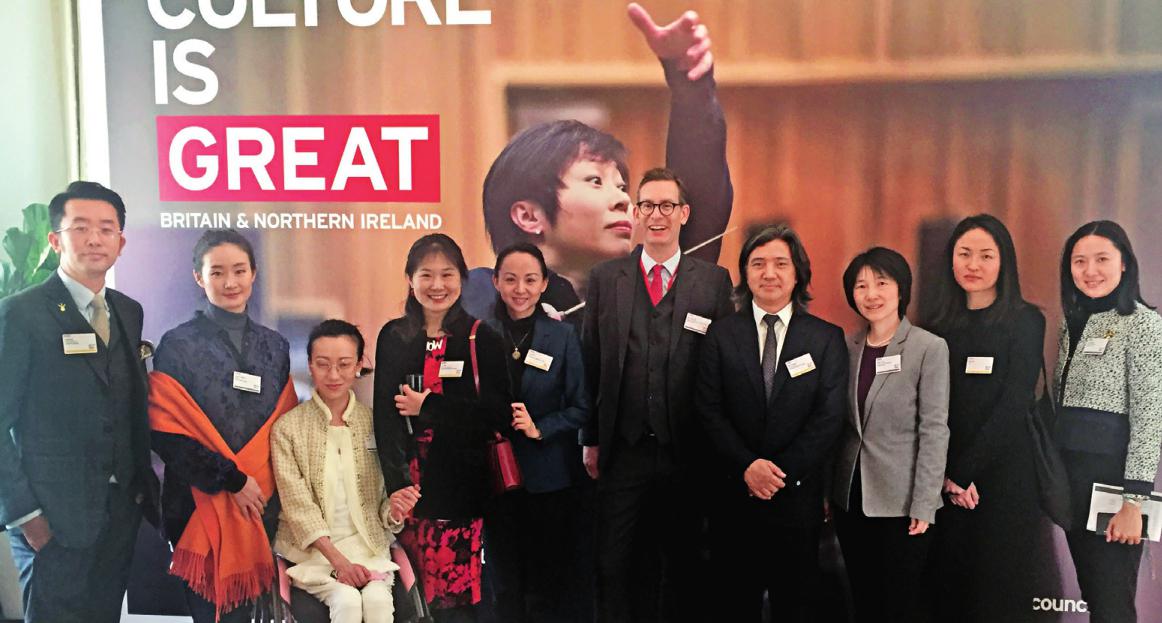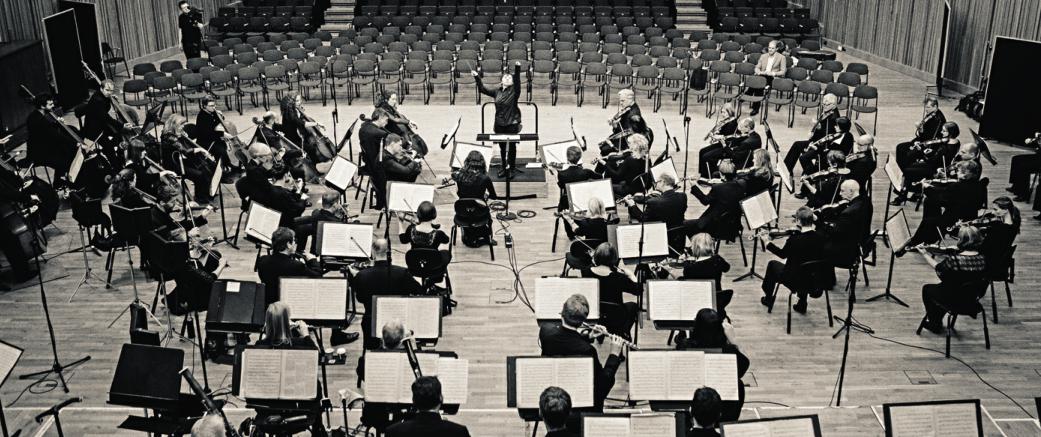Connecting China and the U.K.Through Classical Music
By staff reporter ZHOU LIN

THE National Center for the Performing Arts located on Beijings Changan Avenue was ablaze with lights, and completely full of welldressed British gentlemen, grey-haired senior citizens, and music-obsessed young people and children on December 13, 2018. When musicians from the BBC National Orchestra of Wales (BBC NOW) entered the auditorium and sat down, the principal guest conductor Zhang Xian, dressed in black, took a few brisk steps onto the stage and bowed to the audience. As she turned around, and made a simple gesture to the orchestra, everyone present held their breaths with deep anticipation. The concert hall became so quiet that you could hear the sound of a needle drop.
A Prestigious Asian Conductor
Born in Dandong of Liaoning Province in northeast China, Zhang is not that tall, standing on the podium. When the music started, her body language varied from light and dexterous to majestic and powerful moves. Being adept at all musical instruments and familiar with every performer, Zhang conducted the whole orchestra at ease as if commanding thousands of troops and battle horses with her hands. Those classic melodies created by great Russian composers including Mikhail Glinka, Pyotr Tchaikovsky, and Dmitri Shostakovich reverberated through the concert hall.
Female conductors are seldom seen on the stage.Once the BBC Music Magazine selected 11 female conductors from around the world, and Zhang was the only Asian face among them. Zhang currently holds the positions of music director with the New Jersey Symphony Orchestra and principal guest conductor of the BBC NOW. Enrolled at the middle school affiliated to the Central Conservatory of Music (CCOM) when she was 11 years old, Zhang was successfully admitted by the CCOM six years later, and was taught by famous female conductors Wu Lingfen and Zheng Xiaoying. She then moved to the United States in 1998 and earned her doctorate in conducting from the Conservatory of Music at the University of Cincinnati College. She stayed overseas after graduation and studied under a prominent international conductor, Lorin Maazel.
All these dazzling titles and invaluable experience were the results of Zhangs persistent efforts. “The biggest challenge for a conductor is the repeated study on the full music score and the thorough familiarity with every sheet of music. It is a huge project,”Zhang told China Today. “Half-an-hour performance on the stage means at least more than 20 hours of laborious desk work off the stage.”
Talking about how to handle everything in an easy way, Zhang said honestly, “When I was young, I had a hard time understanding some of Tchaikovskys intricate music. However, as time went on and my experience expanded, I became able to appreciate the marvelous parts of the music, understand diverse versions of his works, and play out my own version of this great artists music. That is a slow and progressive process, and cannot be achieved overnight.”
“Nowadays, most young people are exposed to a wide range of information in various fields. They have musical proficiency and opportunities to communicate with the Western world, enabling them to grow up quickly,” said Zhang, adding that every time she comes back to her homeland, she is surprised to discover that classical music is becoming more and more popular among Chinese youth and children. Nie Jiapeng, the cellist who cooperated with the orchestra to perform Tchaikovskys Variations on a Rococo Theme, is one of the up-and-coming young Chinese players Zhang appreciates most.
Creative Cooperation
During the performance of Shostakovichs Sym- phony No.5 in D Minor, the audiences were captivated by the sound of a flute countermelody which ran through the whole melody like a flittering butterfly. This musical effect was attributed to the harmonious cooperation between the orchestra and its principal flautist Matthew Featherstone. Prior to the concert, Featherstone joined the director of BBC NOW Michael Garvey and CCOM president Yu Feng to hold a teacher-student symposium, and also gave a small-scale performance with the young harpist Sun Shimeng.
“We will have five concerts in Chinas four big cities during this music tour to promote creative cooperation between China and Wales. It is a great honor for me to partner with the four cities and for our orchestra to have a direct interaction with Chinese audiences,” Michael Garvey shared.
According to Zhang, this concert tour was her first trip in China with a European orchestra. “Besides performances and onsite communication in Beijing, personally I am looking forward to our performance in Shenzhen, where the BBC NOW and Shenzhen Symphony Orchestra will cooperate for the first time, providing an opportunity of cultural exchanges for musicians from the two nations.” Throughout all these years, Zhang has devoted herself to the communication and collaboration between musicians in China and the U.K.
Zhangs connection with the U.K. can be traced back to the Promenade Concert held in London in 2013. The annual summer event is the worlds largest and most renowned classical music gathering with a huge audience, and performances and telecasting lasting for two months. During this high-profile event, top symphony orchestras, conductors, and soloists from around the world converge on the Royal Albert Hall in London. In 2013, Zhang was the conductor of the Symphony Orchestra of Milan Giuseppe Verdi who performed at the Promenade Concert, as that year marked the 200th anniversary of the Italian opera composer Giuseppe Verdis birth.
Having lived overseas for two decades and accumulated international fame, Zhang reflected, at the technical level, Chinese musicians have the capability to stand on the global arena; but from the cultural perspective, there is still a long way to go and also some obstacles to overcome. Zhang advocates the communications of culture instead of solely techniques on the level of musical exchanges between China and the West.
Keeping a Well-Balanced Life
A music critic once pointed out that female conductors are often seen in an open-minded Western society, owing to the inclusiveness and the distinct temperament of women. The audience expects a conductor who is easy-going and prone to be a good listener.
Every year, undertaking a total of 80 to 100 performances, together with rehearsals and concert tours that follow, is a tough job for Zhang. Whats more, she has to participate in the production of one or two operas as well. “Sometimes, it takes me eight or nine hours to complete the rehearsal of just one opera per day. Conducting is not just time-consuming, but also brain- and energy-consuming, making it a really demanding job.”
Zhang has been accustomed to taking roundtrips between Europe and the United States. But as a mother of two children, she strives to keep a balance between career and family by strictly controlling time away from home to a maximum of two weeks and then making sure she stays at home and accompanies her children for a few days.
Zhang is also one of the female artists invited by the British Councils flagship campaign “Inspiring Women in the Arts,” from which she hopes to present the female leadership and share her personal experience with more Chinese young women. The council is the U.K.s international organization for cultural relations and education opportunities.
“There are many talented girls who, when faced with the choice between career and family, usually choose the latter because of the pressures from their relatives and friends. They do not try to find a balance between the two roles. Even though it means a more challenging life, it can be achieved,”Zhang told China Today. “Girls should be more courageous to make their own decisions. Do not wait for others encouragement or be stopped by any objections. Be yourself, and do the things that you will never regret.”

